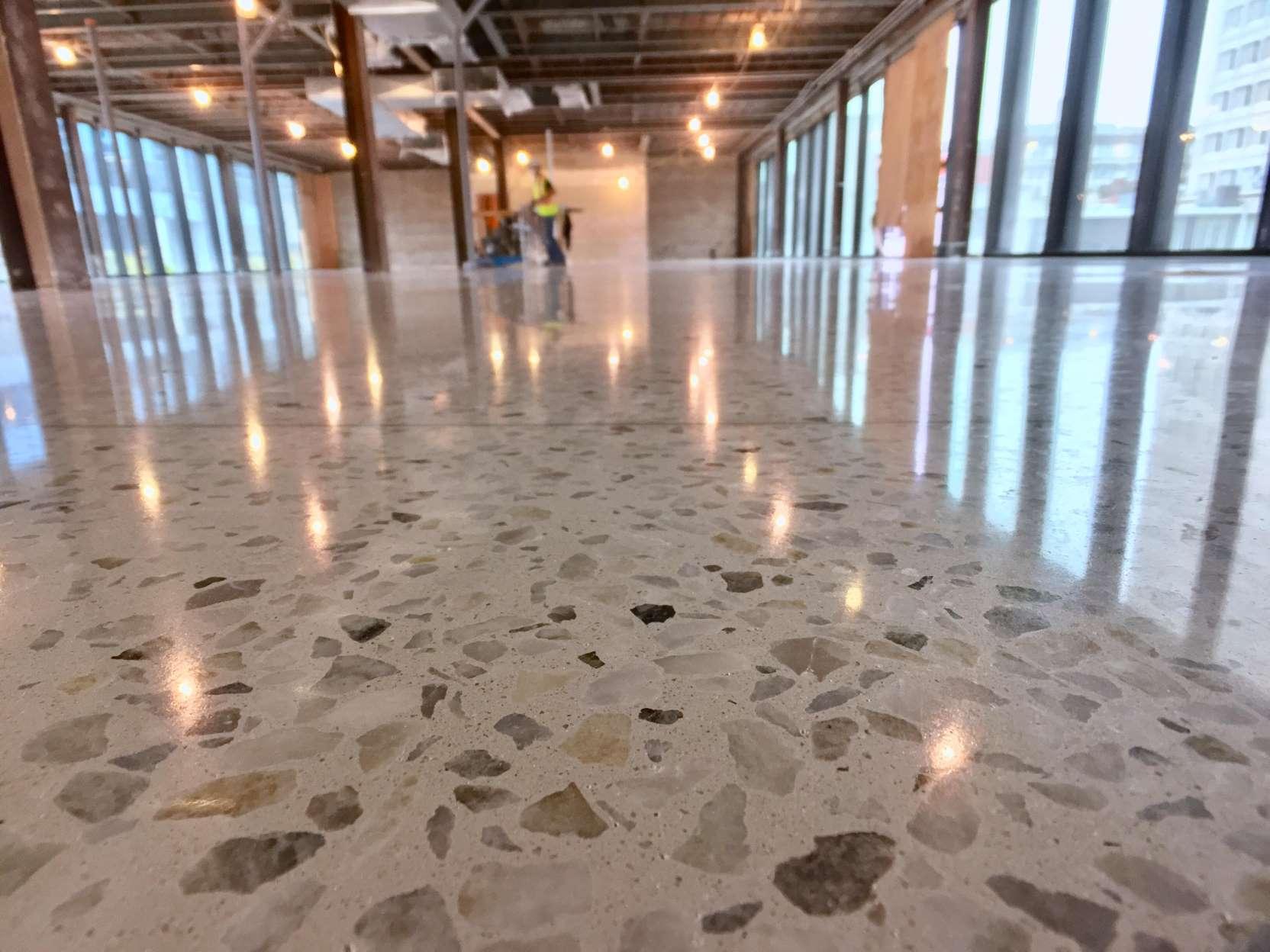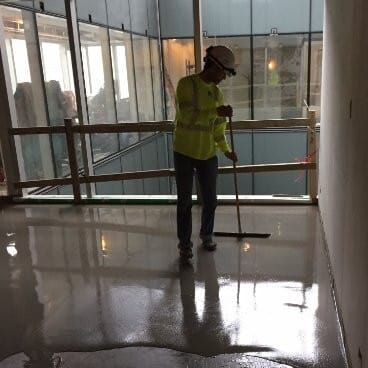
Warehouses have often implemented concrete flooring due to its inherent durability, but homeowners are just now beginning to jump on the bandwagon. Concrete floors are becoming an increasingly popular design trend. Interior designers love the simple and clean aesthetic that concrete floors can offer a modern or contemporary home.
Homeowners are falling in love with the look of concrete, but they aren’t quite sold on its benefits yet. One of the most frequently asked questions has to do with how the concrete will feel underneath the feet on a daily basis. Is a concrete floor really hard on your feet?
Most individuals want a soft and forgiving surface in their home. They want to be able to walk quietly and comfortably across the floors. Particularly for individuals who have knee and back problems, an extremely hard surface can exacerbate their preexisting conditions. All of these factors have prompted homeowners to begin questioning whether concrete is really going to work for their home.
We will take a look at some of the most commonly asked question on this topic below, as well as a few of the solutions.
Is concrete actually a hard surface?
If you’ve spent any time browsing the aisles of a home improvement store, you’ve likely seen bags of “lightweight” concrete for sale. That term may lead you to believe that a lightweight concrete would be softer than its heavier counterparts, but that isn’t necessarily the case. Concrete is going to be an extremely hard and durable surface, regardless of which bag it comes from.
Some flooring surfaces, such as carpet or a floating hardwood floor, will have a little bit of give to the surface. This allows them to move a little more freely and provide a sort of cushion for the feet. A softer surface on the feet helps to absorb some of the shock and prevent unnecessary wear and tear on the knees and back.
Concrete will have none of the give associated with these other flooring types.
Unfortunately, there really is no sugar-coating the fact that concrete is an inherently hard and durable surface. It will hold firm regardless of how much you weigh, what room you install it in, and how long it’s been installed. In many cases, this is precisely the reason that homeowners choose concrete for their flooring surface.
Concrete is well-known for its ability to stand up under extreme conditions, including warehouse traffic. If it can hold up under the traction and weight of a forklift, it will certainly be able to withstand the conditions in your home. The hardness of the material is essential to maintaining its strength, even if it means that you may have some discomfort in your joints if you spend a lot of time walking or standing on the floors.
Is it going to be loud?
Once homeowners recognize that the floor is going to be extremely hard, they often want to know whether it’s also going to be loud. After all, if you’re walking on a floor that has no give to it, won’t the sounds tend to echo?
Noise can certainly be an issue with concrete floors, but it can also pose a problem with tile or hardwood floors. All of the hard surface flooring categories will produce more sound than carpet fibers are known to allow. You may not notice any significant difference above and beyond what you would experience with another common floor covering.
Homeowners can certainly take steps to reduce the amount of echo that they experience within the home.
Have you ever noticed that an empty home tends to echo more than one filled with furniture? This is because the furniture and other knick-knacks tend to absorb some of the sound waves produced. You can take advantage of this little trick to reduce the sound made by your concrete floors. All you need to do is throw in more materials that are known to absorb some of those pesky sound waves.
Many of these items are soft, such as plush sofas, throw pillows, blankets, area rugs, and curtains. Anything made of fabric is likely to help absorb at least some of the echo produced by a concrete floor. The sound issue with concrete is a relatively simple dilemma to correct.
Can I make my concrete floors more comfortable?
If you can reduce the amount of sound produced by a concrete floor, is there anything you can do to make the floors more comfortable to walk on? You can certainly take a few steps to help improve minimize any discomfort you may feel. Take some time to consider where the majority of the traffic in your home is located.
Do you find yourself standing at the kitchen sink for several hours each day? Perhaps there’s one single hallway that you walk through many times throughout the day. Most people notice a higher traffic pattern in some areas of their home compared to others. It’s important to identify which areas these are so you can handle the hardness more effectively.
The best way to create some cushion for your feet and joints is to install area rugs or flooring mats in these places. A simple memory foam rug by the kitchen sink can do wonders for aching knees. Similarly, a large area rug in the living room can help to cushion your feet as you walk around. These items serve a dual purpose of absorbing some sound as well as making your daily experience more comfortable.
Keep in mind that while concrete is very hard, it won’t actually cause damage to the soles of your feet. You will experience the effects of the hardness more in other areas of your body that are less shock-resistant.
It’s true that concrete floors are inherently hard. This is the main reason why many homeowners choose concrete flooring to begin with. You can take a few of these simple do-it-yourself steps to help make your home more comfortable and still reap all the benefits of concrete flooring in Winnipeg.
Why Epoxy Flooring Is Better Than Concrete Flooring?
There are a lot of reasons to love concrete flooring – but you might find that epoxy is even better for your needs. The advantages of epoxy flooring can be broken down into three categories: Aesthetics, function, and cost.
Aesthetics
With concrete floors, your options for different colours and textures are limited. Not so with epoxy flooring. Epoxy comes in any colour you can imagine, and you can even design decorative patterns using multiple colours. By adding certain flakes, pigments or quartz to your epoxy, you can also create stunning, textured similar to terrazzo or marble.
Function
Epoxy flooring is a mainstay in garages across the country because it can be resistant to chemicals, oil spills, and more – all while being durable enough to sustain the weight of a vehicle. You’ll also see it in food courts, showrooms, warehouses, offices and buildings of all kinds. That’s because epoxy can be modified to be slip-resistant, UV-resistant, food grade compliant (FDA and USDA) and more.
Cost
Want to save money on your electric bill every year? Epoxy flooring can be made glossy enough to improve light reflectivity up to 300%, brightening your space and reducing the need for extra lighting. Epoxy floors are also incredibly easy to maintain, which can help home and business owners save money on cleaning supplies and labour.

